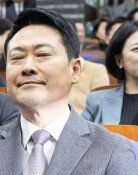[Opinion] Teachers and Sumo Wrestlers
[Opinion] Teachers and Sumo Wrestlers
Posted June. 11, 2005 06:32,
Do you know what teachers and sumo wrestlers have in common? Professor Steven Levitt at the University of Chicago, who is known as a freak, asked this question, presenting something called Freakonomics. If one gives faith to the professors reputation and integrity as a scholar, he cannot but go along with Levitts answer: Both groups cheat. Teachers at public schools in Chicago are assessed and rewarded accordingly in a fair and rigorous manner. Still, those schools have incidents of grade falsification a year that account for five percent. Sumo wrestlers, who are also famous for their rigid discipline, have fixed games. They are motivated by a certain factor: incentives.
In the U.S., the math and reading proficiency of students in New York Citys public elementary and middle schools improved dramatically compared to 15 years ago. Seemingly influenced by Levitts theory, the opponents of No Child Left Behind law express their doubts on the act. They suggest that teachers might have excluded low-performing students from tests or prepared students only for exams with skipping regular lessons. A Democratic NYC mayor candidate and others with a progressive perspective on education doubt that New York Mayor Michael Bloomberg might have provided the results for campaign purposes.
The New York Times supported Mayor Bloomberg in its editorial titled, Kudos for the Education Mayor. Three years ago, he pledged public education reforms. After being elected, he implemented measures to make some students repeat grades, train teachers, and run remedial classes on Saturdays. The editorial said that the mayors decision has been right. Starting next year, NYC plans to measure how much a teacher helped each student to perform better. Even the teachers union is not against the plan. Everyone seems to agree that now mediocre academic achievement cannot guarantee jobs and a middle class life.
In Korea, there still exists discord over the assessment of teachers performance. The government offered a toothless revision according to which teachers are assessed only by their colleagues. The Korean Teachers and Educational Workers Union, on the one hand, agreed to negotiate with the government on that matter. On June 25, on the other hand, the union will hold a protest rally and call for the dismantling of the assessment system. Both students and teachers need incentives to perform better. One wonders what students would think of their teachers who refuse to be assessed while waving the ever-powerful wand of student assessment.
Kim Sun-duk, Editorial writer, yuri@donga.com







